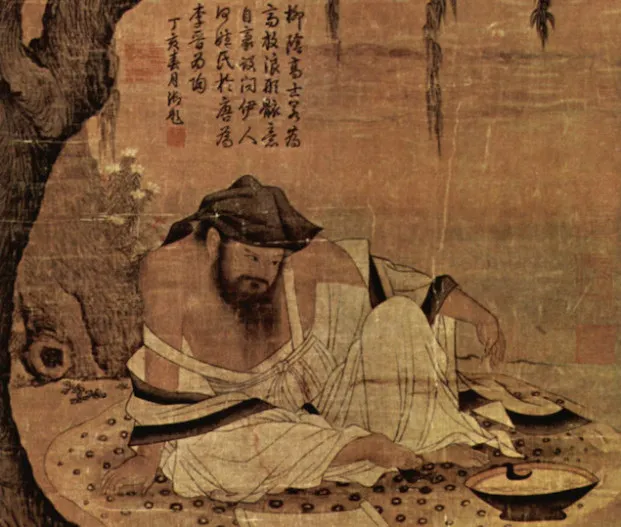Leisure • Eastern Philosophy
Lao Tzu
Surprisingly little is known about the Chinese philosopher Lao Tzu (sometimes also known as Laozi or Lao Tze), the founder and guiding figure of the spiritual practice of Daoism (also translated as Taoism). He is said to have been a record keeper in the court of the Zhou Dynasty in the 6th century BC, and an older contemporary of Confucius. But he may also have been entirely mythical, rather like Homer in Western culture. It is certainly very unlikely that (as some legends say) he was conceived when his mother saw a falling star, or that he was born an old man with very long earlobes – or lived 990 years.

Lao Tzu is said to have tired of life in the Zhou court as it grew increasingly corrupt. So he rode on a water buffalo to the western borders of the Chinese Empire. There, although he was dressed as a farmer, an official recognised him as an enlightened man and asked him to write down his wisdom. According to legend, what Lao Tzu wrote became the sacred text known as the Tao Te Ching. After writing this, Lao Tzu vanished from history, perhaps to become a hermit. In reality, the Tao Te Ching is likely to have been the work of many authors over time, growing embellished and nuanced over two thousand years.
Today there are around half a billion Daoists around the world, mostly in China and Taiwan. They practise meditation, chant scriptures, and worship a variety of gods. Daoists also make pilgrimages to five sacred mountains in eastern China said to possess exemplary spiritual energy.

Daoism is deeply intertwined with two other branches of Eastern thought, Confucianism and Buddhism. Confucius is said by many to have been a student of Lao Tzu and Confucianist practices to this day not only respect Lao Tzu as a great philosopher but also try to follow many of his teachings. Similarly, some believe that when Lao Tzu disappeared, he travelled to India and Nepal and either taught or actually became the person we know today as the Buddha.

A story is often told about these three great Asian spiritual leaders. All were meant to have been given some vinegar to drink. Confucius found it sour, much like he found the world degenerate and chaotic. Buddha found it bitter, much like he found the world full of suffering. But Lao Tzu declared the liquid sweet, a telling conclusion because his thought generally looks benevolently at the discord of the world and sees an underlying harmony guided by a force called the ‘Dao’.
The Tao Te Ching’s central theme is an exploration of the ‘Dao’, or the ‘way’, the path to virtue, happiness and harmony. This way isn’t inherently confusing, Lao Tzu claimed, ‘the great Dao is very even, but people like to take byways.’
The first rule of the way is that we must quieten our consciousness. ‘To the mind that is still,’ Lao Tzu said, ‘the whole universe surrenders.’ We need to let go of our schedules, our worries and our complex thoughts and simply open ourselves to raw experience. We spend so much time rushing, but Lao Tzu reminds us that ‘nature never hurries, yet everything is accomplished.’ It is particularly important that we remember that certain things – grieving, growing wiser, developing new relationships – only happen according to their own schedules, like the changing of leaves or the blossoming of bulbs.
An inner stillness will open us to the richness of experience and of other people. ‘The usefulness of a pot comes from its emptiness,’ Lao Tzu said. ‘Empty yourself of everything and you will gain so much.’ If we are too busy, preoccupied with anxiety or ambition, our lives will end up feeling far shorter than they are. But if we discipline our minds, we can be open to the small tremors of existence: the way light reflects off ripples on a pond, how other people look when they are laughing, the feeling of the wind playing with our hair.
We discover ourselves by being properly receptive to the outside world. ‘When I let go of what I am,’ Lao Tzu wrote, ‘I become what I might be.’
For Lao Tzu, the most instructive work of philosophy is the book of nature. It is in the natural world, in particular its rocks, water, stones, trees and clouds, that we find constant, eloquent lessons in wisdom and calm.
Most of what is wrong with us stems from our failure to live ‘in accordance with nature’. Our envy, our rage, our manic ambition, our frustrated sense of entitlement, all of it stems from our failure to live as nature suggests we should.
Lao Tzu liked to compare different parts of nature to different virtues. He said, ‘The best people are like water, which benefits all things and does not compete with them. It stays in lowly places that others reject. This is why it is so similar to the Way (Dao).’ Lao Tzu drew our attention too to the strength of mountains, the resilience of trees, the cheerfulness of flowers.
For Lao Tzu, trees are constantly tormented by the elements, and yet because they are an ideal mixture of the supple and the resilient, they respond without some of our customary rigidity and defensiveness and therefore survive and thrive in ways we often don’t. Trees are an image of patience, for they sit out long days and nights without complaint, adjusting themselves to the slow shift of the seasons – showing no ill temper in a storm, no desire to wander from their spot for an impetuous journey; they are content to keep their many slender fingers deep in the clammy soil, metres from their central stems and far from the tallest leaves, which hold the rainwater in their palms.
Water is another favourite Daoist source of wisdom, for it is soft and seemingly gentle, and yet, when it is given sufficient time, is powerful enough to mould and reshape stone. We might adopt some of its patient, quiet determination when dealing with certain family members or frustrating political situations.
At one level, it seems strange to claim that our characters might evolve in the company of a waterfall or a mountain, a pine tree or a celandine, objects that, after all, have no conscious concerns, and so, it would seem, cannot either encourage or censor behaviour. And yet an inanimate object may, to come to the lynchpin of Lao Tzu’s claim for the beneficial effects of nature, still work an influence on those around it. Natural scenes have the power to suggest certain values to us – mountains: dignity; pines: resolution; flowers: kindness – and, in unobtrusive ways, may therefore act as inspirations to virtue.
The words of Lao Tzu set a mood. They are peaceful, reassuring and gentle and can serve us well for many daily challenges: getting the children off to school, watching one’s hair go grey, accepting the greater talent of a rival, realising that one’s marriage will never be very easy.
We know that nature is good for our bodies. Lao Tzu’s contribution has been to remind us that it is also full of what deserves to be called philosophical wisdom: lessons that make a particular impression on us because they reach us through our eyes and ears, rather than just our reason.
Of course, there are issues that must be addressed by action, and there are times for speed and ambition. Yet Lao Tzu’s work is an important counterweight, especially in distracted and hurried times. His thought makes a welcome stand for the importance of stillness, openness, reconciliation with natural forces – and the philosophical profundity of mountain streams and flowers.





























